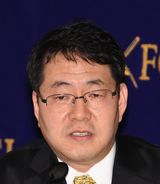Friday, April 28, 2017, 10:30 - 11:30
“Nuclear Disaster Scenarios: Spent Fuel Pool Accidents and North Korea”
Language: The speech and Q & A will be in English
The atomic power plant disasters at Three Mile Island in the U.S. in 1979 and Chernobyl in the former Soviet Union in 1986 introduced the world to the reality of what can go wrong at nuclear plants and the resultant threat to the public from reactor accidents that can release deadly doses of ionising radiation.
The more recent nuclear disaster at Fukushima in Japan introduced another inherent risk that the public was mostly unaware of: Spent nuclear fuel stored in water pools at reactor sites. When a series of explosions blew out the reactor buildings at Fukushima in March 2011, the attention of those tasked with containing the disaster shifted from meltdowns in the reactor core to concern about loss of water in the spent fuel pools. While a meltdown is bad enough, the reactor core is wrapped in a steel and concrete containment vessel to block release of radiation. A spent fuel pool has no such protection and the fear was a loss of cooling water could cause tons of spent fuel to catch fire leading to an uncontrolled release into the atmosphere of high levels of ionising radiation, the type linked to causing cancers.
Although a spent fuel pool fire at the Fukushima Daiichi nuclear plant was avoided, it was subsequently learned this was as much a matter of luck as anything else. A spent fuel fire at Fukushima may have required a compulsory evacuation zone of 31,000 square kilometers involving 35 million people, according to a recent study cited by Dr. Jungmin Kang, a nuclear engineer and our speaker today on this issue. The point is that thousands of tons of spent nuclear fuel are today sitting in pools at reactor sites around the world.
Dr. Kang is one the world’s nuclear scientists arguing for government policies that require shifting spent nuclear fuel into air-cooled dry-cask storage to reduce the radiation risk from accidents in spent fuel pools. If the Fukushima accident wasn’t enough of a warning, he has prepared a hypothetical spent fuel pool accident at the Kori-3 nuclear power plant in South Korea that could contaminate not only a large part of the Korean Peninsula, but also Japan and other neighboring countries.
He has also spent more than a decade analysing North Korea's development of nuclear weapons and will offer his opinions on the status of this program.
Dr. Jungmin Kang is a senior research fellow at the Natural Resources Defense Council, in Washington, DC. Previously, he was a visiting professor at the Korea Advanced Institute of Science and Technology, in Daejeon, South Korea. He has a Ph.D. in Nuclear Engineering from Tokyo University. His interests include the nuclear fuel cycle, spent-fuel storage, and plutonium/HEU production in North Korea.
Please reserve in advance, 3211-3161 or on the website (still & TV cameras inclusive). Reservations and cancellations are not complete without confirmation.
Professional Activities Committee


